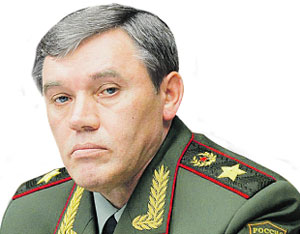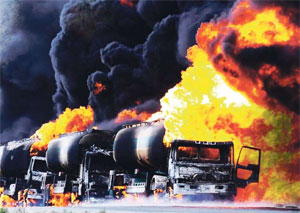Planting Western democratic values destroyed the Middle East

Opponents of Egypt’s Islamist leader Mohammed Morsi celebrate outside the presidential palace in Cairo, Wednesday, July 3, 2013. (AP Photo/Hassan Ammar)
Written by Valery Geracimov; Originally appeared at VPK, translated by Don Courter exclusively for SouthFront
Legislative regulation of the use of Russian military power in the struggle against terrorism, based on the experiences of the end of the 20th and beginning of the 21st centuries during counter-terrorist operations in the Northern Caucasus region.
Today no one has any doubts that Russia then faced not an ideological group of separatists, but a well organized and generously funded force, supported by foreign terrorist elements, in its own country. Military power was used against external aggression and was mandated by the operations of criminal gangs within the country’s territory. A number of governments even unleashed an information war against Russia.
We’ve recaptured the events of the first terrorist attack and have come to several conclusions. First, the armed forces must be prepared for such a struggle in advance. Second, terrorism must be struck proactively in the early stages of its formation and we must not allow its ideology to spread and capture new territories. Third, terrorism cannot be eliminated without the use of military force, only this can bring victory. To triumph in this struggle, it is necessary to unite the government’s political, financial, ideological and informational resources.
For Democracy Under Escort
Speaking of the causes behind the causes of international terrorism requires distinction of a few aspects. Undoubtedly, the conditions for its growth are spawned out of the plights of a number of peoples, such as the lack of developmental opportunities and prospects for a decent standard of living. Radical ideology capitalizes on these problems, resulting in illegal organizations such as Al-Qaeda and the Islamic State. The intervention of foreign states, into the affairs of sovereign nations, materializes as another cause of the terrorist threat. The West’s attempts to force their values upon countries, with their own spiritual foundations and cultural traditions, inevitably fosters negative results. The artificial establishment of these alien ideals have already devastated North Africa and the Middle East.

The effects of “Arab Spring” created a migration crisis across Europe. Libya, in which President Gaddafi was toppled by NATO military intervention, virtually ceased to exist as a coherent state, becoming a harbinger for the growth of ISIS and other terrorist groups.
The occupation of Iraq, the assassination of their political leader, and the “democratization” of the country under the barrels of machine-guns leads to the establishment of ISIS, by disenfranchised former members of the political elites from countries affected, throughout large regions of Iraq.
The third cause of the resurgence of terrorist danger rests with those governments which find it advantageous to use the services of radical organizations in order to achieve their political objectives, destroying states which, although might not be democratic, embody stability. Later, emerging from the patrons’ shadows, the bandit underground begins to grow, explore vast territories, and form an economic base, spawning a quasi-structure that results in the destabilization of all regions and posing a threat to all of civilized humanity.
On Lawful Foundations
Syria, where the process of destabilizing the government and overthrowing the lawfully elected government continues by the same techniques used elsewhere, is a prime example. The instability began with organized protests, fed information from external sources. Then, violent attacks on law enforcement and representatives of the authorities erupted; moreover, the mass of terrorist attacks was supported by organizations behind the scenes.

By the middle of the year, the situation became critical. The question of preserving Syria as a sovereign state was on the table. A change in power would have meant the inevitable fragmentation of the country under the banner of ethno-religious extremists. Developments on the scenario in Libya would illustrate the process of a newly prosperous country becoming a terrorist breeding ground that threatens the entire region’s stability.
As a result, the Middle East formed a clear threat to Russia’s national security. According to our estimates, ISIS and other terrorist groups had enlisted up to 4,500 citizens of the Russian Federation and other CIS countries at the beginning of 2015. It is not difficult to predict where these terrorists will focus their efforts next, once the Assad regime falls. Under these circumstances, the President of Russia, in response to the official Damascus appeal, accepted the decision to use armed forces to conduct anti terrorist operations in the territory of the Syrian Arab Republic. It was also approved by the Federation Council.
Again, we speak of military participation in the struggle against terrorism, not to intervene in the affairs of another state or to support a radical religious current. Our units are legally operating in Syria at the request of the government — the same cannot be said of the US led coalition which is de jure violating all canons of international law.
From September 30th, 2015, the Russian Air Force has been providing air support against terrorist targets. Targets are selected on the basis of reliable intelligence, confirmed by means of unmanned aerial vehicles, and only after a careful selection of targets is made. Concurrently, we have not struck schools, hospitals, and/or mosques, even though we know some of these buildings are being used, by terrorists, as weapons storage facilities.
In addition to air strikes, the Russian Armed Forces in Syria have been solving other problems. Our advisors are assisting Syrian military commanders in preparing military operations against terrorist forces and have been involved in the education and training of reserve units, as well as their formation.
Ankara is out of step
In facilitating Russian Air Force operations in Syria, special attention is paid to the prevention of conflicts within the country’s borders. Despite the halting of military cooperation between the US and Russia, mutual interest has warranted the preparation and signing of a bilateral memorandum on the prevention of incidents in the skies over Syria. In the future, compliance with the rules outlined in such an agreement requires all participants of the US-led coalition to create the channels necessary for operational cooperation with Russia.
In Baghdad, the four-sided coalition of Iraq, Iran, Syria, and Russia acts as an information center for counter-terrorist intelligence. This coalition acts as a successfully functioning mechanism of interaction between the defense ministries of Russia and Israel, within the framework of cooperation in preventing incidents around Syria.

In carrying out the February 27th US-Russian statement, the Armed Forces have an additional set of tasks related to the cessation of hostilities, expansion of humanitarian operations, and the liberation of settlements and territories. At Hmeymim Airport, we established the Center for the reconciliation of the warring parties of Syria. This organization is actively involved in the implementation of the agreements reached in cooperation with a similar US backed structure in Amman and the task force in Geneva. Today, the paramount role of the Russian Armed Forces in Syria rests with the promotion of reconciliation between major military powers and the launching of political processes in the country.
However, one of the destabilizing factors that retains a significantly negative impact is the sale of Ankara’s weapons, ammunition, and drugs to terrorist elements. Hospitals in Turkey continue to rehabilitate militants.
In conclusion, we carry out our actions with the understanding that the fate of a country, its political system, and those who hold power must be chosen by the people of that country. Syria must retain its autonomy and, thanks to the efforts of multinational cooperation, it will remain a secular state.





